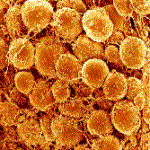
I say article of the week, but I have been lazy this summer (or maybe just consumed by other things). My last “article of the week” was in May and my last Plengegen blog post was over a month ago!
By now everyone knows the PCSK9 story. Human genetics identified the target; functional work in mouse and human cells led to a mechanistic understanding of PCSK9’s role in LDL receptor recycling; therapeutic modulation was shown to lower LDL cholesterol in clinical trials; and the FDA approved drugs based on LDL lowering, with outcome trials underway to demonstrate (presumably) cardiovascular benefit. What the story highlights is that a mechanistic understanding of causal pathways in human disease is key to the success of translating targets into therapies. Further, the PCSK9 story underscores the importance of a simple biomarker (LDL cholesterol) to measure a complex causal pathway in a clinical trial.
A recent study in the New England Journal of Medicine (NEJM) provides insight into a putative causal pathway in obesity, and thus a potentially a new mechanism for therapeutic modulation. The accompanying Editorial also provides a nice perspective.
[Disclaimer: I am a Merck/MSD employee. The opinions I am expressing are my own and do not necessarily represent the position of my employer.…

